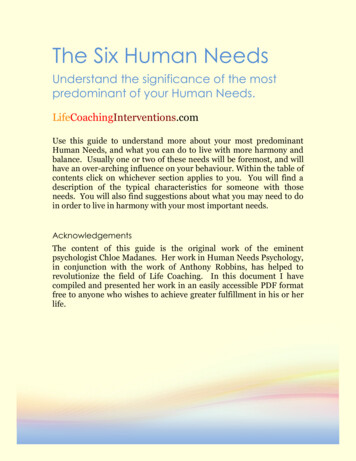
Transcription
THE 6 HUMAN NEEDSBy Jennifer Price, INTERNATIONAL INTERVENTIONIST; life transformation: marriage, business, health,and personal lifeThe 6 Human Needs is by far, in my opinion, the greatest strategy for living a fulfilled life. The conceptof basic human needs was first birthed by Sigmund Freud, noted and contributed to by severalpsychologists over the years, and most famously pulled together by Brooklyn-born Americanpsychologist Abraham Maslow (1908-1970). He proposed six basic human needs. Tony Robbinsrecently adapted Maslow's theory and teachings into one of the greatest tools in existence for lifetransformation: The 6 Basic Human Needs.We all have needs, not just for basic survival, but 6 profound needs that must be fulfilled for a life ofquality. The needs are: Love/Connection, Variety, Significance, Certainty, Growth, and Contribution.The first four needs are necessary for survival and a successful life. The last two needs (growth andcontribution), are necessary to experience a fulfilled life. Some of you may be thinking, "I need WATERand FOOD, CHOCOLATE, CLOTHES and JESUS!!!", and you are correct - but those all fall within the 6Human Needs. This will be a long article, but hang in there. it'll be worth it!LOVE & CONNECTIONEveryone needs to feel connection with someone or something. We all hope and strive for love, to giveand to receive. The need for love and connection begins at the start of life - babies and children needlove and touch, and the need continues throughout life. In adulthood, this need is rounded out withthe concept of romantic love, marriage, the devotion to one person. In some cultures romantic lovedoes not exist, being replaced by tribe and family, and in other cultures marriages are arranged.Whatever your culture, love and connection are not only universal, but key to healthy emotional wellbeing. The need for love and connection can be satisfied in positive or negative ways. The means forsatisfying these needs can be good for you, those around you, and society, they can be neutral, ornegative for all.Let's look at a few ways, positive and negative, we satisfy our need for love and connection.Positive means: love and connection from immediate family members and/or close friends through quality time connection with community and/or work performing good deeds, volunteering being kind, receiving kindness marital intimacy words of affirmationPage 1
cuddling with your partner or your childrenloving on your petsconnection to religiongiving/receiving giftseye contactacts of servicephysical affectionjoining clubNegative means: dominating and controlling others who are forced to show appreciation to you because youhelp them with one of their dire needs being helpless so people have to take care of you (attention, compassion, physical/financialhelp always talking about your illness (creates connection, love, and empathy from others) staying depressed (you receive attention, compassion, empathy, and help from others) emotional eating (a form of self love, self soothing, self connection) deviant sexual activity (connection, superficial love, attention) addiction (a form of self soothing, self connection) children displaying rebellion or other bad behavior to seek attention from busy or neglectfulparentsAnswer these questions:o What do you do to feel love and connection? Is it by giving, receiving, or both?o What do you do to receive love and connection from others?o How do you give love and connection to others?o Do you experience love on a regular basis or do you hold back because of fear?o How can you improve your fulfillment of love and connection in healthy ways moving forward?VARIETYAh, variety -- the Spice of Life! We all love variety to some degree. What's interesting is, for one personvariety means watching a television show, wearing blue socks instead of the usual black, or orderingsomething different from the menu of your favorite restaurant. For the next person, variety meansbase jumping, gambling upwards of 500,000 a pop, or swimming with sharks off the Gold Coast ofAustralia.Page 2
We all want and need variety in our lives. Variety exercises our emotional, psychological, mental, andphysical range. Variety is one way to combat depression and anxiety. A good dose of variety is healthyand the excitement that ensues is necessary to feel alive.Some forms of variety create suspense and surprise, and this keeps us on our toes. Variety can be funand exciting for some, and feel risky and terrifying for others. Which category do you fall in?On the flip side, the same monotonous routine breeds boredom and, if not addressed swiftly andcorrectly, can foster harmful experimentation in the form of change, all to satisfy the need for varietyand conquer boredom.Positive means: different forms of exercise participating in a club going to a spa extreme sports attending live arts spontaneous date nights with your spouse/partner travel learning a new hobby or skill watching the news, a quality tv show or movieNegative means: deviant sexual behavior creating drama/conflict/problems violent behavior emotional eating viewing pornography becomes overly excited during crisis experimenting with addictive drugs and/or alcohol, can lead to addiction cigarette smokingIt is crucial to plan Variety in your life.How would you answer these questions?o How do you meet your need for Variety?o What do you do with your physiology, focus, and language during your variety vs. times whenyou experience boredom?o What are the differences in your feelings and behavior between the two?o Do you have problems, hesitations, or fears that give you emotional uncertainty and preventyou from trying new things?Page 3
SIGNIFICANCEWho doesn't like to feel special, significant, or important to another person or group of people? Towant to feel important doesn't make you prideful, needy or a narcissist. We need to feel important,needed and wanted in life.This need begins when we are infants; babies and children need to feel #1 in their parent's lives. Theneed is so great that siblings begin to compete with each other for attention - hence "sibling rivalry".Children will fight for a way to feel special and different from their sibling(s). They do this in positiveways (humor, academics, who is better/faster at completing chores, talents, who has better behavior),and in negative ways (naughty behavior, telling lies to cover up mishaps and out of fear of rejection ordiscipline, tantrums, rebellion to gain attention). Lack of feeling significant is a form of low self esteembecause it stems from comparing ourselves to others. A hierarchical pecking order develops and webegin to question our superiority, inferiority, and in the end, significance/importance.On a positive note, this is one element in life that makes us raise our standards. On the flip side, if webecome hyper-focused on significance, we develop difficulty connecting with others becausecomparisons breed differences, not commonalities.We feel connected with others in two broad ways: (on a deeper level) - when we realize they genuinelycare about us and we care for them, and (on a more superficial level) - if we have things in common.The first step to helping someone feel significant - allow them to feel that you genuinely care for them.Do you struggle with insignificance? If so. is this your parent's fault because of the way they raisedyou? Your siblings fault? A mean teacher who, in school, told you you'd never amount to anything? Abully? It doesn't always matter WHY a person has low self esteem. What matters is how to combat it.Without feelings of significance, we are left to feel small and unworthy. We all have these same 6human needs, but find vastly different ways of satisfying them. Our needs can be satisfied in positive,neutral, or negative ways. As adults, some find significance through being different - personal style:clothing style, tattoos, hair style, piercings. Others find significance through personality: 'the life of theparty', 'the wise one', or 'the dramatic one'. Artists can find significance through the popularity of theirpaintings, photography, or music. Have a look at the list below for examples of finding significance,both positive and negative.Positive means: serving one's country in the military providing for your family meaningful work (career, home-making, volunteer) major contribution to humanity (invention, medical breakthrough) financial wealth (provided you do charitable things with your money) success - being the best at something (athlete, business, entertainment) breaking through big problemsPage 4
through spiritualityachievementbuilt something greatsuccessful at something healthy / positive / goodNegative means: failure - (some people actually feel significant if they are the worst at something, this bringsthem attention and help, which fosters feelings of significance) being the sickest in the group (for the same reason as above) pride - pride sometimes sets in when a person's self esteem is so low, they force themselves tobelief they are greater than they really are at something so they feel important by tearing down someone or something, trash talking, gossip for children, who has the most toys gang violence makes a gang member significantAnswer these questions:o What do you do to feel significant?o How do you make others feel significant?o Do you experience significance on a regular basis? If you are married, do you feel that you arethe most significant person in the world to your spouse?o Do you make your spouse feel like the most important person in the world to you?o If you are a parent, are you most important to your child/children?o Do they feel most important to you?CERTAINTYWhat is Certainty as it pertains to Human Needs? It's the desire to feel safe, to be comfortable in yourenvironment, and to experience pleasure while avoiding pain. Without Certainty, one is left to live infear. With a great amount of Certainty, you feel stable, grounded, protected, secure, and can predictcertain necessary safeguards in your life.Like every other basic human need, the amount of necessary Certainty varies from person to personand is fulfilled in different ways, both in positive/healthy ways and in negative/unhealthy ways.One person experiences Certainty with a one room apartment living on minimum wage, another feelsCertainty if they know the shelter three blocks away will accept and feed them for the night, whileanother only feels Certainty if they make over two million dollars annually. Like the other five needs,it's relative - based on your psychological blueprint.The human brain is not designed to handle great levels of uncertainty, it's too stressful, therefore aperson will go to great and desperate lengths to obtain Certainty in life. Avoiding pain is one of thePage 5
brain's survival instincts because continuous pain causes damage, and continuous damage leads topoor overall health (psychological, emotional, and physical) and eventually death.The quality of your life depends on how well you adapt to uncertainty. If you handle uncertainty well,you will handle life well. That kind of flexibility and adaptivity breeds motivation, creativity, the abilityto learn, and the desire and ability to change.Positive Means: having a roof over your head having enough food knowing how to obtain health care when needed knowing your neighbor won't attack job security marriage security maintaining a close relationship with your children after they leave the home holding faithfully to religious beliefs security in family relations and friendshipsNegative Means: hoarding (brings a false Certainty that you'll never do without) over-eating ( blood rushes to the stomach, you breathe deeply and harder, and feel alive) smoking (you inhale more deeply and harder, waking you up, making you feel more alive) trying to control others (example: trying to control your spouse out of fear of abandonment,failure, etc. so you feel safe/Certainty) trying to manipulate others (same reason as above) alcoholism (it's a certain/guaranteed way to relax, ease social situations) complaining / always having a problem (brings certainty of attention and compassion) micromanaging (brings certainty that things will be done your way) withdrawing (brings certainty that you'll be missed or talked about, and may bring attention) being clingy towards your spouse/friend/child to make you feel CertaintyThe first step to gaining Certainty, if you feel you're lacking, is to look at your overall life and realizeyou’ve already made it through so much, you've always been able to do it, you're are okay now, youare not your circumstances, to persevere, and work to improve. The second step is to step back andlook at all the blessings in your life - and be grateful for them. Spend time in gratitude for what youhave.Page 6
Answer these questions:o How do you obtain Certainty?o When you feel uncertain, unsafe, unstable, or ungrounded, what do you do with your focus tofeel more Certainty?o Do you have an empowering belief?o A religion to turn to?o Do you focus on something in your past or on hope for the future?o Do you find yourself using the same negative or positive language patterns?o How can you better fulfill your need for certainty moving forward?GROWTHEverything in existence is either growing or dying. Humans need growth in every capacity: spiritually,intellectually, physically, and emotionally. Development in all four areas is key to a healthy life.Does spiritual satisfaction exist? I'm not sure. Even during great spiritual growth, although temporarilygrateful and enriched, we are left with the desire for more - thus the need to continue growing closerto God. From infancy to adulthood, we constantly grow and change physically.Although we don't continue to grow in height, we do continue to physically change until death andthrough it all, our bodies hunger for physical activity. Physical activity is necessary for a healthy body,less we sit, gain weight and lose muscle, and disease sets in. Emotionally, we change and grow withevery life experience, from events in our personal lives to events in the world. Intellectually, werespond to all stimuli around us. Intellectual growth is a lifelong endeavor and occurs daily throughreading, learning hands-on, and witnessing other's success and failure.When we stop being physically active, our bodies degenerate. When we stop growing intellectually,our memory fades, cognitive ability diminishes, and the brain physically shrinks. When we stop growingemotionally/psychologically, we regress in appropriate thoughts, feelings, and behavior.When we stop growing, we die.Whatever you value in life: marriage, health, relationships, career success, integrity/character, money,love, generosity, contribution, virtue - all must be cultivated, worked, practiced, expanded. It takesenergy and hard work, but is the reward not worth it?Positive Means of Growth: exercise reading study / learn something new constantly personal development, growing into a better person learn a musical instrument take up a new hobby or sport grow in faithPage 7
Negative Means: sliding backwards / growing into a despicable human give in to harmful behavior (being controlling, manipulative, lying) give in to bad habits watching too much tv How do you experience Growth? When you want to grow, what do you do with your focus? How do you plan to fulfill your need for Growth in healthy ways from this point forward?CONTRIBUTIONContribution is the act of looking beyond oneself, going beyond one's own needs, and giving to otherswith no hoped for or expected personal gain. It's contributing to other people, a cause, or to amovement. It's a way to leave a legacy, a mark on the world, to make a difference.We contribute in many different ways, based on our talents, skills, abilities, interests, and desires.Contribution is the King of the 6 Human Needs because it regulates the others. If you focus onContribution, you'll have Connection, and probably love, with others while helping them. You'll haveVariety as you're doing something different from your everyday routine. Significance is fulfilledbecause you know you’re helping others, improving lives, making a difference. You'll have Certainty ofbeing able to contribute. Growth occurs because anytime you contribute to others, you growspiritually, mentally, emotionally/psychologically, and, if there's physical activity involved, you'll growphysically.Contribution is key to experiencing a life of fulfillment.Here are a few examples.Positive Means of Contribution: volunteer work a service-based career: teaching, police, coaching, medical, religious spending time with grandchildren, nephews & nieces, other family members, neighbors, theelderly visiting nursing homes community service charitable donations writing a book giving to your children or other family members or friends adopting a child fostering childrenPage 8
P a g e 9Negative Means to Contribution: contributing to the destruction of others gossiping ganging up with others on an individual (bullying) selling drugs being condescending prostitution creating negative art that influences others: pornography, bad music politicians/government officials and the general public voting towards degeneration of nationAnswer these questions:o How do you Contribute and why is it important to you to Contribute in the ways you do?o What drives your desire to Contribute the way you do?o Have you Contributed in negative ways?How, and what did you learn from it?CONCLUSIONThe first four Human Needs (Love/Connection, Variety, Significance, and Certainty) are necessary forhuman survival and are the fundamental needs of the personality.The last two Human Needs (Growth and Contribution) are needs of the spirit and are necessary for alife of fulfillment.When you have a belief or behavior that simultaneously fulfills three of the Human Needs, you becomeaddicted to it. Please see just a few examples below:Positive: being in a healthy romantic relationship/marriage fulfills Love/Connection (with yourpartner), Significance (you feel important to your partner), Variety (you do fun things together,changes your physical and mental states), Growth (as you grow together, learn more abouteach other, and depend on each other for fun), Certainty (knowing your partner will always bethere for you, unconditionally), Contribution (you contribute to them and their life: theirwellbeing, career, happiness, and spiritual life). volunteer or service-based work fulfills Connection and sometimes Love (as you connect with,love, and receive love from those you serve), Significance (you and your work are important tothose you serve), Certainty (the need of your service will always be there), Variety (it's differentfrom your everyday life and brings a new element into your daily routine), Growth (whenserving others, growth occurs mentally, emotionally, spiritually), Contribution (you arecontributing in a positive way to those in need). exercise Love/Connection (with self, and others if in a group or gym), Variety (changes yourphysical, emotional, and mental states), Growth (positive physical changes occur in the bodyand brain), Certainty (you are certain that exercising will clear your mind, oxygenate andawaken your body, shed fat, build muscle and strength), Significance (you know you're doingPage 9
something important for your overall health), and Contribution (if you're exercising in a groupthat feeds off your energy and presence).Negative: Alcohol and drug addiction fulfills Love/Connection (connecting and soothing oneself),Certainty (it's always there and you can depend on it), Variety (it changes your mood fromanxious to calm, from depression to being numb or experiencing a euphoric high), andSignificance (you now feel important as you're catering to your needs and self-soothing). Over-eating / emotional eating Love/Connection (self-soothing), Significance (you feel incontrol which makes you feel important), Certainty (you can depend on eating to sootheyourself), Variety (eating brings blood to your stomach and when filled, you breathe deeplywhich makes you feel more alive; it changes your state) Creating drama Connection (with others, even if negative), Significance (you feel importantwhen delivering dramatic news, positive or negative), Variety (you're no longer bored with yourlife), Certainty (you're certain to gain attention from those around you) Gang violence Love/Connection (with the members in your gang), Significance (you'remarking your place in the gang, gaining respect from fellow gang members), Variety (the rush ofadrenaline and emotions changes your state, even if for the negative), Contribution (you'recontributing to the success of your gang).Now you can understand how easily and quickly habits and addictions occur, both positive andnegative. Thus, the importance of being mindful of your every thought, feeling, word, and action.Don't want to put the effort in? Okay, but you'll remain stuck, empty, anxious, miserable, depressed,and unsuccessful.Living an intentional and purposeful life takes energy, thought, and practice, and incorporating theseelements is key to success and fulfillment.Need further help understanding the needs, getting unstuck, and how to create balance in your life?Set up a consultation to discuss working with me and how I can help you. To book that appointment,click HERE.Until next time, love one another,Page 10Accessed January 2021 from: 20/the-greatest-strategy-6-basic-humanneeds#: :text %2C%20Growth%2C%20and%20Contribution.
psychologist Abraham Maslow (1908-1970). He proposed six basic human needs. Tony Robbins recently adapted Maslow's theory and teachings into one of the greatest tools in existence for life transformation: The 6 Basic Human Needs. We all have needs, not just for basic survival, but 6 profound needs that must be fulfilled for a life of quality.










